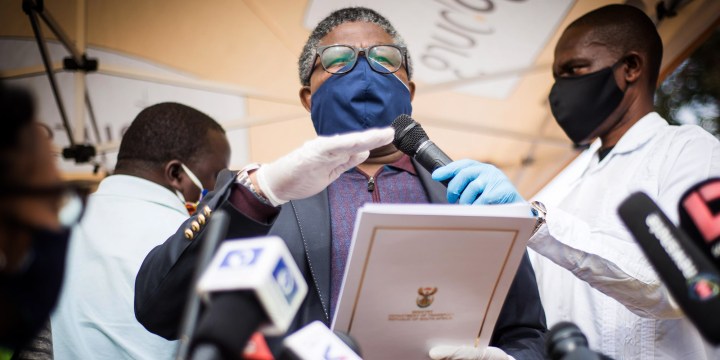LOCKDOWN ALERT LEVEL 3
Mbalula spells out new taxi regulations

It’s up to taxi rank owners to now implement safety mechanisms, Transport Minister Fikile Mbalula announced as he unpacked the government’s latest regulations on transport.
The responsibility of keeping passengers safe now rests with owners of taxi ranks, said Transport Minister Fikile Mbalula on Thursday 16 July as he expanded on the transport related proclamations made by President Cyril Ramaphosa on Sunday.
Ramaphosa announced that taxis would be allowed to operate at 100% loading capacity, something that the National Taxi Association had pleaded with Parliament to allow.
Read in Daily Maverick: Allow us to operate at full capacity, pleads taxi association before Parliament
Speaking to the media on Thursday, Mbalula announced various adjustments to Alert Level 3 regulations, but the main focus of the briefing was about the regulations the taxi industry would face now that operators could load short-distance trips at full capacity.
“As a sector, we carry the burden of enabling economic activity whilst containing the spread of the virus, through our various modes of transport,” said Mbalula.
“We have no doubt that public transport could pose a real threat to the efforts towards containment of the rapid spread of the pandemic.”
Under the first iteration of Alert Level 3 regulations, taxis were limited to a 70% loading capacity.
Watch the public broadcaster’s stream of the media briefing here:
Addressing journalists, Mbalula said, “While the rules relating to disinfecting and sanitising public transport facilities, as well as social distancing have been in place, we have now placed the responsibility to enforce this squarely in the hands of the owners of such facilities.”
The minister said owners of facilities “may not allow any member of the public to enter their facilities without wearing a cloth face mask, homemade item, or another appropriate item that covers the nose and mouth”. Drivers and other employees must also wear face masks or other appropriate items that cover the nose and mouth, along with a face shield.
Additional requirements include:
- Operators must ensure public transport vehicles are sanitised before picking up and after dropping off passengers.
- Public transport vehicle windows must be kept open by 5cm on both sides.
- All public transport vehicles must be fitted with window jammers or blockers in order to keep the windows open by 5cm.
- Operators must ensure all public transport vehicle doors, window handles, arm rests and handrails are sanitised after every load.
- Passengers must be encouraged to sanitise after entering and exiting the vehicle.
- No passenger will be allowed to use any form of public transport or enter a building, place or premises if they do not wear a cloth mask or appropriate face covering.
- All public transport operators must put measures in place to adhere to physical distancing to curb the spread of the virus.
However, long-distance trips are still at 70% loading capacity and occupants need to have permits as under the original Alert Level 3 requirements.
Other details from the briefing includes the reopening of East London Airport, George Airport and Kimberley Airport. These airports “have met all the requirements and will resume operations on 21 July 2020,” said Mbalula.
Western Cape MEC for Finance and Economic Development David Maynier, who had previously asked for George Airport to be reopened, welcomed the announcement.
In a media release after Mbalula’s briefing, Maynier said: “As a critical transport link for providing access to the Garden Route District for many business travellers across South Africa, this decision provides much-needed support to jobs and the economy in the Western Cap. That is why we have been working hard, together with the Airports Company of South Africa (Acsa), the George Airport management, George Municipality and our provincial Department of Health, to find a solution which will allow the George Airport to meet the criteria required for the airport to open.”
Maynier said the provincial health department would partner with the airports company to ensure there is Covid-19 screening at the airport.
Other measures mentioned at the briefing include that private vehicles can now operate at full capacity, with occupants wearing masks – additional specific regulations will be published later, said the director-general of the Transport Department, Alec Moemi.
When asked if one needed to wear a mask while driving, Moemi answered: “If you are travelling alone you don’t need to,” but when there are passengers in the vehicle, all occupants need to wear a mask.
“Transportation of liquor is only permitted for movement from a manufacturing plant to storage facilities, as well as transportation from manufacturing facilities to exit ports for export,” said Mbalula. “However, transportation of liquor for sale, dispensing and distribution to customers is prohibited.”
Commuter rail is limited to a 70% occupancy, while long-distance rail operations are still prohibited.
Mbalula also announced that transport operating licences and accreditation certificates for tourist services that had expired during the lockdown will be deemed valid for another 90 days. DM

















 Become an Insider
Become an Insider